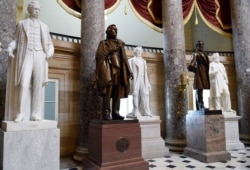House Speaker Nancy Pelosi said Thursday that it's time to remove symbols honoring Confederate figures from the U.S. Capitol and military bases as the pandemic and racial unrest force a national reckoning with racial discrimination.
"These names have to go from these bases and these statues have to go from the Capitol," Pelosi said at her weekly news conference. "The American people know these names have to go."
Confederate monuments have reemerged as a national flashpoint since the death of George Floyd, a black man who died after a white Minneapolis officer pressed a knee into his neck for several minutes. Protesters decrying racism have targeted Confederate monuments in multiple cities, and some state officials are considering taking them down.
President Donald Trump vowed Wednesday that he would not rename military bases honoring Confederate generals, even as NASCAR announced it would ban displays of the Confederate flag at its races.
But Republicans in the Senate, who are at risk of losing their majority in the November elections, aren't with Trump on this issue. A GOP-led Senate panel on Thursday approved a plan by Senator Elizabeth Warren to have the names of Confederate figures removed from military bases and other Pentagon assets.
The ban would be imposed within three years and was approved by a voice vote as a piece of the annual Pentagon policy bill. A commission would be set up to oversee the process. The provision is likely to be matched when the Democratic-controlled House takes up the measure in coming weeks.
'Highest ideals'
Confederate symbols remain on Capitol Hill as well and are coming under attack as public opinion has dramatically shifted since Floyd's killing.
"The statues in the Capitol should embody our highest ideals as Americans, expressing who we are and who we aspire to be as a nation," Pelosi wrote earlier. "Monuments to men who advocated cruelty and barbarism to achieve such a plainly racist end are a grotesque affront to these ideals."
At her press conference, she said of Trump: "He seems to be the only person left who doesn't get it."
The presence of statues of generals and other figures of the Confederacy in Capitol locations such as Statuary Hall — the original House chamber — has been denounced by African American lawmakers for many years. Former Representative Jesse Jackson Jr., D-Ill., was known to give tours pointing out the numerous statues.
But it's up to the states to determine which of their historical figures to display in the Capitol. Jefferson Davis, a former U.S. senator from Mississippi who was president of the Confederate States of America, is represented by one of two statues from that state. Pelosi noted that Davis and Confederate Vice President Alexander Stephens, whose statue comes from Georgia, "were charged with treason against the United States."
Senators on the Armed Services Committee approved the amendment on renaming the bases on a bipartisan voice vote, but it was not with robust debate — and some dissent.
Chairman James Inhofe, R-Okla., wanted assurances local communities would have input, aides said. There was also a push to ensure some flexibility, for example, for commanders who served both sides. Exceptions are also made for grave markers, all but ensuring no disruptions at Arlington National Cemetery, the aides said.
But no senators on the panel flatly opposed the plan. The new commission will be made up of eight members — four from the Defense Department and four, from both parties, in the Senate.





